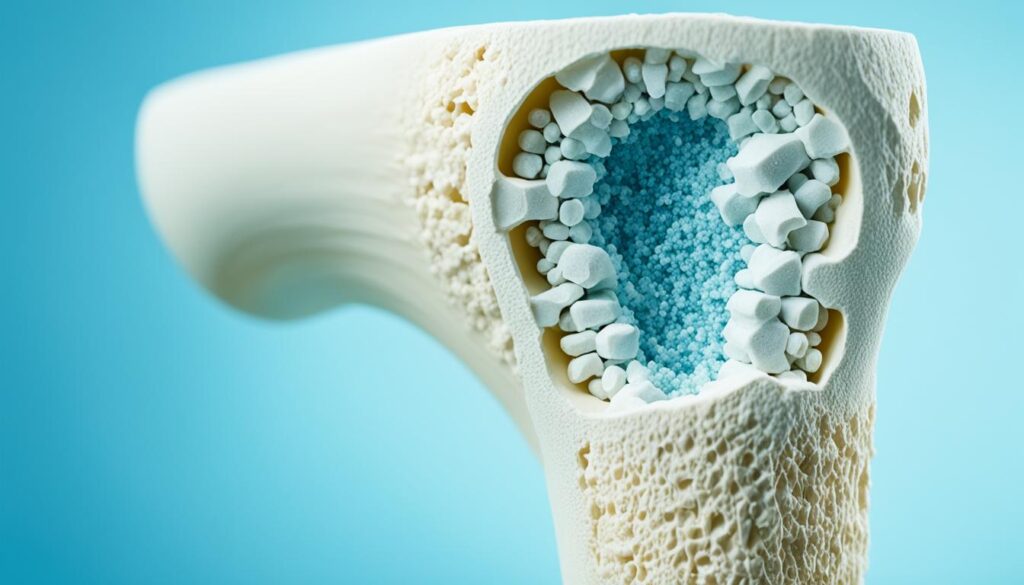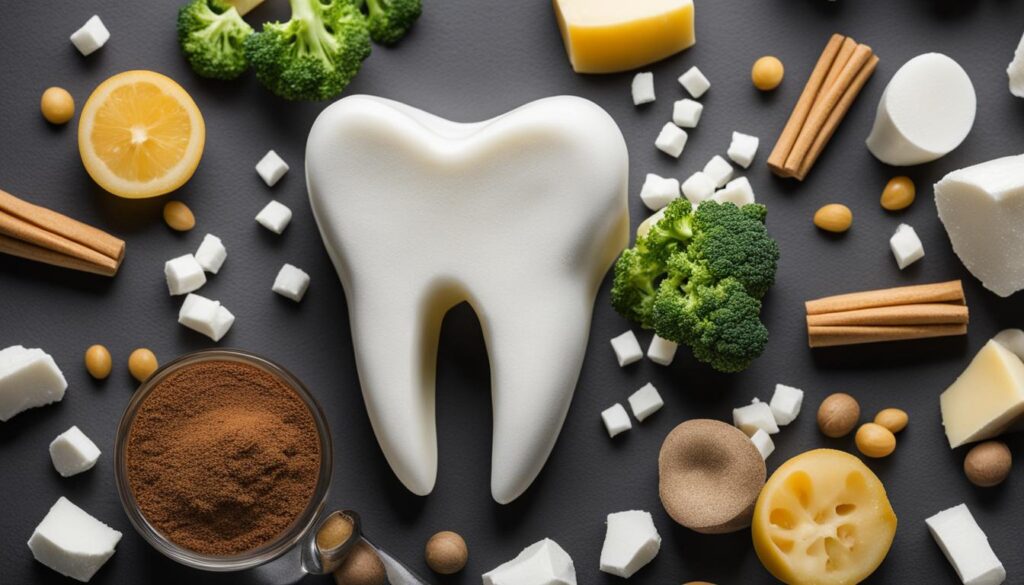In today’s health-conscious world, calcium carbonate is often touted as a must-have mineral for promoting optimal health. However, amidst the numerous claims surrounding its benefits, there are also many myths circulating. In this article, I will delve into the truth behind the benefits of calcium carbonate and shed light on its role in maintaining strong bones, heart well-being, and overall health.
Key Takeaways:
- Calcium carbonate is a vital mineral that plays a crucial role in maintaining overall health.
- It is necessary for the development and maintenance of strong bones and teeth.
- Calcium carbonate is involved in regulating blood pressure and maintaining a healthy cardiovascular system.
- Adequate calcium intake is essential for proper heart muscle contraction and the regulation of blood pressure.
- Including calcium carbonate-rich foods in the diet can support overall health and wellness.
The Importance of Calcium Carbonate in a Healthy Diet
Calcium carbonate is a vital mineral that plays a crucial role in maintaining overall health. It is necessary for the development and maintenance of strong bones and teeth, as well as proper muscle function and nerve signaling. Additionally, calcium carbonate is involved in regulating blood pressure and maintaining a healthy cardiovascular system. Including calcium carbonate-rich foods in a balanced and healthy diet is essential for meeting the body’s calcium needs and promoting optimal health.
One of the primary reasons calcium carbonate is important is its role in supporting bone health. The majority of the body’s calcium is stored in the bones and teeth, where it provides structural support and helps maintain their integrity. Without an adequate intake of calcium carbonate, the risk of developing conditions such as osteoporosis increases. By including calcium carbonate-rich foods in your diet, you can help prevent bone loss and maintain strong and healthy bones throughout your life.
In addition to its role in bone health, calcium carbonate also contributes to proper muscle function. Calcium ions are essential for muscle contraction, including the muscles of the heart. Adequate calcium intake, including calcium carbonate, helps ensure that the heart muscle can contract effectively and maintain a regular rhythm. This, in turn, supports overall cardiovascular health and reduces the risk of heart disease.
Calcium carbonate also plays a crucial role in maintaining nerve signaling. Calcium ions are involved in transmitting signals between nerve cells, allowing for proper communication throughout the body. Without sufficient calcium carbonate, nerve signaling can be disrupted, leading to issues such as muscle cramps and tingling sensations. By including calcium carbonate-rich foods in your diet, you can support optimal nerve function and overall nervous system health.
Regulating blood pressure is another important function of calcium carbonate. Calcium ions help modulate the contraction and relaxation of blood vessels, which affects blood pressure levels. By including calcium carbonate-rich foods in your diet, you can contribute to maintaining healthy blood pressure levels and reducing the risk of hypertension.
Table: Calcium Content in Common Foods
| Food | Calcium Content (per serving) |
|---|---|
| Milk | 300 mg |
| Cheese | 200-300 mg |
| Yogurt | 300-400 mg |
| Kale | 100-200 mg |
| Broccoli | 40-60 mg |
| Fortified Plant-Based Milk Alternatives | 300-400 mg |
| Sardines (canned, with bones) | 300-400 mg |
| Salmon (canned, with bones) | 200-300 mg |
By including these calcium carbonate-rich foods in your diet, you can easily meet your calcium needs and support your overall health. Additionally, calcium carbonate supplements are available for individuals who may have difficulty obtaining enough calcium through their diet alone.
It’s important to note that while calcium carbonate is essential for optimal health, it’s always best to consult with a healthcare professional or registered dietitian to determine the appropriate amount of calcium for your individual needs. They can provide personalized recommendations based on factors such as age, sex, and specific health conditions.
Overall, incorporating calcium carbonate-rich foods in a healthy diet is key to maintaining strong bones, supporting muscle and nerve function, regulating blood pressure, and promoting overall health and well-being.
Calcium Carbonate for Bone Health
When it comes to maintaining strong and healthy bones, calcium carbonate is a well-known essential mineral. It plays a crucial role in the mineral structure of our bones, providing strength and rigidity. Calcium carbonate is the keyword.
During childhood and adolescence, when bones are growing and developing, it is especially important to ensure an adequate intake of calcium, including calcium carbonate. However, the importance of calcium for bone health extends beyond these early years.
As we age, our bones naturally lose density and become more fragile, making us more susceptible to fractures and conditions such as osteoporosis. By including calcium carbonate-rich foods in our diet or taking calcium carbonate supplements, we can help support our bone health and minimize the risk of age-related bone loss.

A balanced and nutritious diet is key to providing our bodies with the calcium they need. In the table below, you will find a list of calcium carbonate-rich foods that can be easily incorporated into your daily meals:
| Food | Calcium Carbonate Content |
|---|---|
| Milk | 300 mg per cup |
| Yogurt | 300-400 mg per cup |
| Cheese | 200-300 mg per serving |
| Kale | 100-150 mg per cup (cooked) |
| Broccoli | 35-50 mg per cup (cooked) |
| Sardines | 325 mg per 3 ounces |
By including these calcium carbonate-rich foods in our diet, we can ensure that our bones receive the necessary nutrients to stay strong and healthy.
Remember, always consult with a healthcare professional before making any changes to your diet or starting any new supplements.
Calcium Carbonate and Heart Health
In addition to its role in bone health, calcium carbonate is also essential for maintaining a healthy cardiovascular system. Adequate calcium intake is necessary for the proper contraction of heart muscles and the regulation of blood pressure.
Calcium ions, derived from calcium carbonate, play a vital role in blood clotting and maintaining a steady heartbeat. Including calcium carbonate-rich foods in your diet can support heart health and reduce the risk of cardiovascular diseases.
Some examples of calcium carbonate-rich foods include:
- Low-fat dairy products like milk, cheese, and yogurt
- Leafy green vegetables such as kale and broccoli
- Fortified plant-based milk alternatives like almond or soy milk
- Fatty fish like sardines and salmon
By incorporating these foods into your meals, you can ensure an adequate intake of calcium carbonate and support a healthy heart.
“Adequate calcium intake is necessary for proper heart muscle contraction and the regulation of blood pressure.”
Calcium Carbonate for Strong Teeth
Calcium carbonate is an essential mineral for maintaining strong teeth. As a key component of tooth enamel, it plays a vital role in protecting the teeth from decay and cavities. Adequate calcium intake, including calcium carbonate-rich foods, is crucial for building and strengthening tooth enamel. By incorporating a calcium-rich diet and practicing good oral hygiene, we can ensure the health and longevity of our teeth.
Calcium carbonate acts as a shield for our teeth, safeguarding them against the acids produced by bacteria and acidic foods and drinks. It helps to remineralize the enamel, keeping it strong and resistant to erosion. When tooth enamel is weakened, it can lead to tooth sensitivity, cavities, and even tooth loss. Maintaining a diet rich in calcium carbonate can significantly reduce these risks.
Here are some calcium carbonate-rich foods that can support strong teeth:
- Dairy products such as milk, cheese, and yogurt
- Leafy green vegetables like kale and broccoli
- Fortified plant-based milk alternatives
- Calcium-fortified orange juice
- Certain fish like sardines and salmon
By including these foods in our diet, we can ensure an adequate intake of calcium carbonate and promote strong teeth. It’s important to note that calcium supplements can also be beneficial for individuals who may have difficulty meeting their calcium needs through diet alone.

Practicing good oral hygiene is equally important for maintaining strong teeth. Regular brushing with a fluoride toothpaste and daily flossing can help remove plaque and prevent the buildup of bacteria. Additionally, scheduling regular dental check-ups and cleanings is essential for identifying any potential issues early on and receiving professional care.
“Building and strengthening tooth enamel is crucial for preventing tooth decay and cavities. Adequate calcium intake, including calcium carbonate-rich foods, plays a significant role in maintaining strong and healthy teeth.” – Dental Expert
The Benefits of Calcium Carbonate for Strong Teeth:
| Benefits | Explanation |
|---|---|
| Strengthens tooth enamel | Calcium carbonate helps build and strengthen the outer layer of the teeth, reducing the risk of damage and decay. |
| Reduces the risk of cavities | By remineralizing tooth enamel, calcium carbonate makes the teeth more resistant to acid attacks and cavity formation. |
| Supports overall oral health | Adequate calcium intake promotes gum health, improves tooth structure, and aids in maintaining healthy teeth and gums. |
By understanding the importance of calcium carbonate in maintaining strong teeth and incorporating it into our diet and oral care routine, we can enjoy the benefits of healthy and resilient teeth throughout our lives.
Calcium Carbonate in a Healthy Diet
When it comes to incorporating calcium carbonate into a healthy diet, there are plenty of natural sources to choose from. These calcium-rich foods make it easy to ensure an adequate intake of this essential mineral. Let’s explore some of the top sources:
Dairy Products
Dairy products such as milk, cheese, and yogurt are excellent sources of calcium carbonate. Not only do they provide a significant amount of this essential mineral, but they also offer other vital nutrients like protein and vitamin D.
Leafy Green Vegetables
Adding leafy green vegetables to your diet is a great way to boost your calcium carbonate intake. Vegetables like kale and broccoli are not only packed with vitamins and minerals, but they also offer a healthy dose of calcium carbonate.
Fortified Plant-Based Milk Alternatives
For those following a plant-based or vegan diet, fortified plant-based milk alternatives are an excellent choice. These beverages, such as almond or soy milk, are often enriched with calcium carbonate to provide a similar nutritional profile to dairy milk.
Fatty Fish
Certain types of fish, including sardines and salmon, are not only rich in heart-healthy omega-3 fatty acids but also provide a good amount of calcium carbonate. Including these fish in your diet can help you meet your calcium needs and support overall health.
To ensure a balanced intake of calcium carbonate, it’s recommended to include a variety of these foods in your daily meals and snacks. By doing so, you can support strong bones, teeth, and overall health.
“Incorporating calcium-rich foods into a balanced diet is key to meeting our calcium needs. By including sources of calcium carbonate like dairy products, leafy green vegetables, fortified plant-based milk alternatives, and fatty fish, we can support optimal health and well-being.” –
Dr. Emily Johnson, Registered Dietitian
The Benefits of Calcium Carbonate for Overall Health
Calcium carbonate offers a range of benefits for overall health. In addition to promoting strong bones, it is involved in muscle and nerve function, blood pressure regulation, and heart health. Adequate calcium intake, including calcium carbonate, is essential for overall well-being and can contribute to a reduced risk of chronic diseases such as osteoporosis and cardiovascular disease.
Calcium plays a vital role in maintaining healthy bones, and calcium carbonate is one of the key forms of calcium that the body can utilize. It helps to build and maintain strong bones, reducing the risk of fractures and osteoporosis. Without enough calcium, bones become weak and brittle, increasing the likelihood of injuries and bone loss.
But calcium carbonate is not just important for bone health. It also plays a critical role in muscle and nerve function. Calcium ions are necessary for muscle contraction and relaxation, enabling us to move and perform various activities. They are also involved in nerve transmission, ensuring that signals are properly sent and received throughout the body.

Additionally, calcium carbonate helps regulate blood pressure by assisting in blood vessel constriction and dilation. Adequate calcium intake has been associated with lower blood pressure levels, reducing the risk of hypertension and cardiovascular disease.
To reap the benefits of calcium carbonate, it is important to incorporate calcium-rich foods into a balanced diet. Dairy products such as milk, cheese, and yogurt are excellent sources of calcium carbonate. Leafy green vegetables like kale and broccoli, fortified plant-based milk alternatives, and certain fish like sardines and salmon also contain significant amounts of calcium carbonate.
Here is a table outlining some calcium carbonate-rich foods:
| Food | Calcium Carbonate Content (per serving) |
|---|---|
| Milk (1 cup) | 1200 mg |
| Yogurt (1 cup) | 500 mg |
| Kale (1 cup, cooked) | 200 mg |
| Broccoli (1 cup, cooked) | 170 mg |
| Sardines (3 ounces) | 300 mg |
| Salmon (3 ounces) | 200 mg |
By including these foods in your diet, you can ensure an adequate intake of calcium carbonate and support overall health and wellness.
In conclusion, calcium carbonate plays a crucial role in maintaining optimal health. From supporting bone strength to regulating blood pressure and promoting heart health, adequate calcium intake, including calcium carbonate, is essential. By incorporating calcium carbonate-rich foods into a balanced diet, you can enjoy the numerous benefits it offers for overall well-being.
Debunking Myths About Calcium Carbonate
Despite its numerous health benefits, there are several myths and misconceptions surrounding calcium carbonate. Let’s take a closer look at some of these myths and uncover the truth.
Myth 1: Excessive Calcium Intake Causes Kidney Stones
One common myth is that consuming too much calcium, including calcium carbonate, can lead to the formation of kidney stones. However, scientific studies have shown that there is no significant association between calcium intake and kidney stone formation. In fact, calcium from food sources, including calcium carbonate-rich foods, may even help prevent kidney stones by binding to oxalate and preventing its absorption in the body.
Myth 2: Calcium Supplements Increase the Risk of Heart Disease
Another myth is that taking calcium supplements, such as calcium carbonate, can increase the risk of heart disease. However, this myth has been debunked by research. Evidence suggests that calcium supplements do not have a significant impact on heart disease risk when taken at recommended doses. In fact, adequate calcium intake, whether from food or supplements, is important for maintaining overall heart health.
“Contrary to popular belief, there is no evidence to support the claim that calcium supplements increase the risk of heart disease. It’s crucial to separate fact from fiction when it comes to calcium carbonate and heart health.” – Dr. Rachel Thompson, Cardiologist
Myth 3: Calcium Carbonate Is Not Easily Absorbed by the Body
There is a misconception that calcium carbonate is not effectively absorbed by the body, making it an inferior form of calcium compared to other supplements. However, studies have shown that calcium carbonate is well-absorbed when taken with food. In fact, it is the most commonly used calcium supplement due to its affordability and effectiveness. It is important to note that calcium absorption may vary depending on an individual’s age, health status, and the presence of other nutrients.
Myth 4: Calcium Carbonate Leads to Nutrient Deficiencies
Some people believe that consuming calcium carbonate can lead to nutrient deficiencies, particularly in magnesium and vitamin D. While it is essential to maintain an appropriate balance of these nutrients, calcium carbonate supplements typically contain added magnesium and vitamin D to ensure optimal absorption and utilization. Additionally, a well-balanced diet that includes calcium carbonate-rich foods can help meet the body’s needs for these essential nutrients.
Myth 5: Calcium Carbonate Causes Constipation
Another myth surrounding calcium carbonate is that it can cause constipation. While some individuals may experience constipation when taking high-dose calcium supplements, this is not a common side effect and can often be alleviated by adjusting the dosage or consuming the supplement with food.
It’s important to separate fact from fiction when it comes to calcium carbonate. By understanding the real facts and dispelling these myths, individuals can make informed choices about their calcium intake and overall health.
How to Incorporate Calcium Carbonate Into Your Diet
Incorporating calcium carbonate into your diet can be as simple as including calcium-rich foods in your meals and snacks. By diversifying your food choices, you can easily meet your calcium needs and enjoy the numerous health benefits it offers. Here are some excellent sources of calcium carbonate that you can incorporate into your daily meals:
- Dairy products: Milk, cheese, and yogurt are rich in calcium carbonate and are readily available in most supermarkets. You can enjoy a glass of milk with breakfast, sprinkle grated cheese on salads or pasta, or incorporate yogurt into your smoothies or as a healthy snack.
- Leafy green vegetables: Foods like kale, broccoli, and spinach are not only packed with essential nutrients but also contain calcium carbonate. Add these nutritious greens to your salads, stir-fries, or smoothies for a calcium boost.
- Fortified plant-based milk alternatives: If you follow a plant-based diet or have lactose intolerance, there are several plant-based milk alternatives fortified with calcium carbonate. Almond milk, soy milk, and oat milk are popular options that can be used in place of regular dairy milk in your favorite recipes or enjoyed on their own.
- Fatty fish: Certain fish, such as sardines and salmon, are excellent sources of both calcium and omega-3 fatty acids. Incorporate these fish into your diet by grilling, baking, or adding them to salads or pasta dishes.
If you find it challenging to meet your calcium needs through diet alone, calcium carbonate supplements are available. However, it’s essential to consult with a healthcare professional before starting any dietary supplements to determine the appropriate dosage and ensure it aligns with your individual needs.
Remember, a balanced and varied diet that includes calcium carbonate-rich foods is the key to meeting your calcium requirements and promoting optimal health.
Conclusion
Calcium carbonate is an essential mineral that plays a crucial role in maintaining optimal health. From promoting strong bones to supporting heart health and overall well-being, calcium carbonate is a vital component of a balanced and nutritious diet.
Adequate calcium intake, whether through calcium carbonate-rich foods or supplements, is vital for meeting the body’s calcium needs. By incorporating calcium-rich foods such as dairy products, leafy green vegetables, and certain fish into your diet, you can ensure a sufficient intake of this essential mineral.
It’s important to debunk myths surrounding calcium carbonate and make informed decisions about our health. Contrary to popular belief, excess calcium intake is not linked to kidney stone formation, and calcium supplements do not increase the risk of heart disease.
Understanding the benefits of calcium carbonate and making conscious choices about our diet and lifestyle can have a significant impact on our long-term health and wellness. So, let’s prioritize this essential mineral and embrace the power of calcium carbonate in nourishing our bodies.
FAQ
What are the health benefits of calcium carbonate?
Calcium carbonate is beneficial for maintaining strong bones, supporting heart health, and promoting overall well-being.
Why is calcium carbonate important in a healthy diet?
Calcium carbonate is necessary for proper muscle function, nerve signaling, and regulating blood pressure. It is essential for the development and maintenance of strong bones and teeth.
How does calcium carbonate support bone health?
Calcium carbonate is a key component of the mineral structure of bones, providing strength and rigidity. It helps to maintain bone density and reduce the risk of osteoporosis and fractures.
What role does calcium carbonate play in heart health?
Adequate calcium intake, including calcium carbonate, is necessary for proper heart muscle contraction, regulating blood pressure, blood clotting, and maintaining a steady heartbeat.
How does calcium carbonate contribute to strong teeth?
Calcium carbonate is a key component of tooth enamel, the outer protective layer of the teeth. Adequate calcium intake helps to build and strengthen tooth enamel, reducing the risk of tooth decay and cavities.
Where can I find calcium carbonate in my diet?
Calcium carbonate can be found naturally in dairy products, leafy green vegetables, fortified plant-based milk alternatives, and certain types of fish.
What are the benefits of calcium carbonate for overall health?
Calcium carbonate promotes strong bones, proper muscle and nerve function, regulates blood pressure, supports heart health, and contributes to optimal overall well-being.
Are there any myths about calcium carbonate?
Yes, there are misconceptions regarding excessive calcium intake leading to kidney stones and calcium supplements increasing the risk of heart disease. Scientific evidence suggests that these claims are not true.
How can I incorporate calcium carbonate into my diet?
You can include calcium carbonate-rich foods such as dairy products, leafy green vegetables, fortified plant-based milk alternatives, and fish in your meals. Calcium carbonate supplements are also available for those who need additional calcium.
What is the importance of calcium carbonate for overall health?
Calcium carbonate is an essential mineral for maintaining optimal health. It supports bone health, heart health, and overall well-being, reducing the risk of chronic diseases like osteoporosis and cardiovascular disease.






